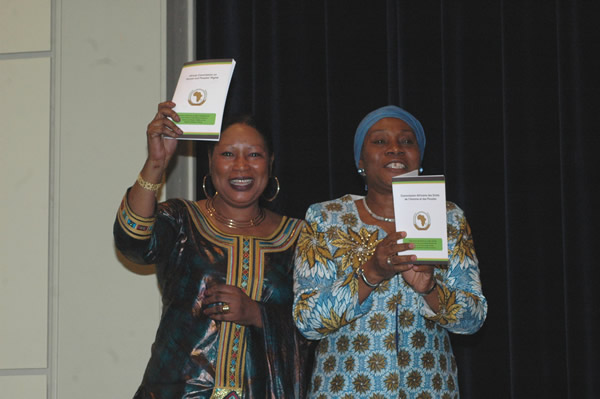On 12 April 2013, the African Commission on Human and Peoples' Rights officially launched the General Comments to article 14(1)(d) and (e) of the Protocol to the African Charter on Human and Peoples' Rights at the Commission's 53rd Session in Banjul, The Gambia.
Under the guidance of the Special Rapporteur on the Rights of Women in Africa, and in collaboration with the Centre for Human Rights and regional experts, the General Comments were drafted, and adopted, to provide specific guidance about the obligations of states under these provisions. They further aim to support the Special Rapporteur in the promotion and implementation of the Women’s Rights Protocol; to equip civil society organisations with a yardstick for advocacy and state accountability; and to guide the future jurisprudence of the Commission.
The Centre for Human Rights will continue to work closely with the African Commission, in particular, the Special Rapporteur on the Rights of Women in Africa, to disseminate the General Comments widely and promote implementation of the provisions at the domestic level.
![]() Download the General Comments on article 14(1)(d) and (e) of the Protocol to the African Charter on Human and Peoples’ Rights on the Rights of Women in Africa (English)
Download the General Comments on article 14(1)(d) and (e) of the Protocol to the African Charter on Human and Peoples’ Rights on the Rights of Women in Africa (English)
![]() Téléchargez les Observations Générales sur l'article 14(1)(d) et (e) du Protocole à la Charte africaine des Droits de l'Homme et des Peuples relatif aux Droits des Femmes en Afrique (Francais)
Téléchargez les Observations Générales sur l'article 14(1)(d) et (e) du Protocole à la Charte africaine des Droits de l'Homme et des Peuples relatif aux Droits des Femmes en Afrique (Francais)

Statement on the background to and drafting of the General Comments of the African Commission on Human and Peoples’ Rights on article 14(1)(d) and (e) of the Protocol to the African Charter on Human and Peoples’ Rights on the Rights of Women in Africa, on the occasion of the launching of these general Comments, Banjul, The Gambia, 13 April 2013
Frans Viljoen, Director, Centre for Human Rights, University of Pretoria
Like many international human rights treaties, the Protocol to the African Charter on Human and Peoples’ Rights on the Rights of Women in Africa contains some provisions that are not formulated with great precision. It is only when such open-ended provisions become the subject of a complaint before the Commission, or when the Commission in some other way provides normative clarity, that their content becomes much more distinct. In the past, the Commission has given normative guidance on thematic aspects of the African Charter through the adoption of resolutions, declarations or guidelines, focusing on particular themes, such as the Dakar Declaration on the Right to a Fair Trial (on the right to a fair trial) and the Robben Island Guidelines on Torture (on torture).
Under the guidance of the Special Rapporteur on the Rights of Women in Africa, a process was set in motion to provide greater clarity about provisions of particular interest and importance to women in Africa, namely, articles 14(1)(d) and (e) of the Women’s Rights Protocol relating to women's health and reproductive rights in the context of HIV. While these provisions have been widely praised as the first time an international human rights treaty dealt with and specifically mentioned HIV and AIDS, the nature of the state obligations arising from them were not clear. The need for normative guidance was exacerbated by the fact that, several years after the adoption and ratification of the Protocol, the level of implementation at the domestic level remains disappointing, and no complaints alleging violations of the Women’s Rights Protocol have been decided. The General Comments on articles 14(1)(d) and (e) were therefore adopted to assist states by providing specific guidance about their obligations under these provisions; to support the Special Rapporteur in the promotion and implementation of the Women’s Rights Protocol; to equip civil society organisations with a yardstick for advocacy and state accountability; and to guide the future jurisprudence of the Commission.
The General Comments differ from declarations and guidelines, thus far adopted by the Commission, in that they provide a detailed interpretation of a particular treaty provision, based on a close analysis of the wording and an examination of the implications of the particular provision.
The process of drafting these General Comments benefited from the expertise and insights of many: First, the Special Rapporteur, who oversaw and guided the process, supported by her staff at the Secretariat (in particular Charles Nguena), and other members of the Commission; second, a network of women’s rights NGOs, particularly the members of the Solidarity for African Women's Rights Network; third, all the participants in the numerous consultative working groups and drafting meetings (and in particular, Dr Ebenezer Durojaye, who is present here today); fourth, Master’s students participating in the Women’s Rights Clinic of the Centre for Human Rights (one of whom are here today, Ms Satang Nabaneh); and last, staff of the Centre, in particular the Head of the Gender Unit, Karen Stefiszyn, who steered and kept the process towards adoption of these General Comments on track. After an intensive and participatory process, the Commission adopted the General Comments at its 52nd session, held in Côte d’Ivoire, in October 2012.
We trust this first by the Commission will not be a milestone that is soon forgotten, but is take to heart and becomes a guiding beacon for all concerned about women’s sexual and reproductive rights, and in particular, their vulnerability to HIV infection.


